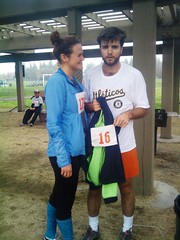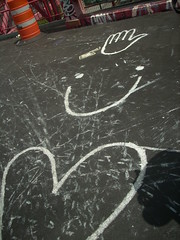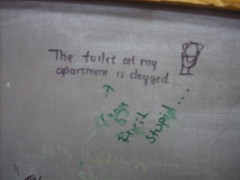
Most families have pet folklore. My dad recently recounted the epic story of how he acquired our first family dog, Tomasino Paisano de la Lucci, a black and white springer spaniel mix that he sprung from a pound when he was in his 20s. At the time, my dad was working in the Bay Area, and one day while driving to work, he found an injured puppy in the middle of the road. He gathered him up and took him to his office where he called the SPCA to see if they could save him. The SPCA collected the dog with the understanding that they were required to turn the dog over to the local shelter for three days for the owners to come claim him before making the dog available for adoption. Meanwhile, they agreed to treat the dog's wounds.
My dad went back to the pound a few times to see how the dog was doing. Each time, the technicians reminded him that if he wanted the dog, he'd have to wait til the end of the week, at which point he'd also have to pay the vet bill. Dad showed up just before closing time on Friday, but the technician turned him away, saying that they had to wait three full days, so Dad would have to come back Saturday. They refused to let him come take the dog on the day they told him to come; according to their rules, they had to wait a certain amount of time for owners to collect the dog, but neither could they afford to keep the dog any longer than a specific amount of time.
"If you want the dog, you’ll be here at 8:00 am sharp," they said, "or he’ll be put down on the first rounds tomorrow morning."
Dad was pissed. Why did they even bother treating the dog in the first place, if they wouldn't put him up for adoption, and would end up killing him anyway? He asked to speak to the supervisor, and was told the same thing. Come back Saturday morning, or forget the dog. They would not even take payment and hold the dog until Monday.
He didn't know what to do. He felt trapped. Here he had gone out of his way to follow the center's instructions, and was happy to pay the vet bill, would have arranged for someone else to pick up the dog for him, but they wouldn't allow that either. He went out into the parking lot and watched the dogs interacting in their cages. Tommy was sitting in a little pen surrounded by a chain link fence.
He approached the fence, stuck his hands through the holes and whistled for the dog. Once he was close enough, Dad reached out and took Tommy gently in his hands, slowly edging him up the length of the fence, first withdrawing one hand through the gaps, then the other. Miraculously, no one seemed to notice. He got the little dog him up the height of the fence, he pushed him through a small, puppy-sized opening. Dad says Tommy was a bit confused, but offered no resistance as he hopped across the parking lot and into his car, and eventually, our life.
Tommy lived to be 15 years old. He went where my dad went. I'll never forget the night he died. I was eight years old and it was a school night, so I was surprised when my mom woke me and Josh up in the middle of the night and took us out onto the lawn. Tommy usually slept in a little bed on my parents' floor, but my dad had carried him, wrapped tenderly in towels, down the stairs and outside. I think the moon was full. Tommy was old and frail, his eyes lost in flappy ears and withered fur. And my dad, my dad leaned low over him, as if whispering to him, and stayed that way for what seemed like hours. When it was over we had a little service and dug a little hole for him under the rosebush.
For years my dad referred to Tommy as "my fine dog." My parents have had dogs since, always rescue dogs, always black and white, always T names: Tipper (during the Clinton administration), Tam, and Taj. They were all wonderful dogs, but to be called "fine" -- that was a distinction my dad reserves for a rare few.









































.jpg)